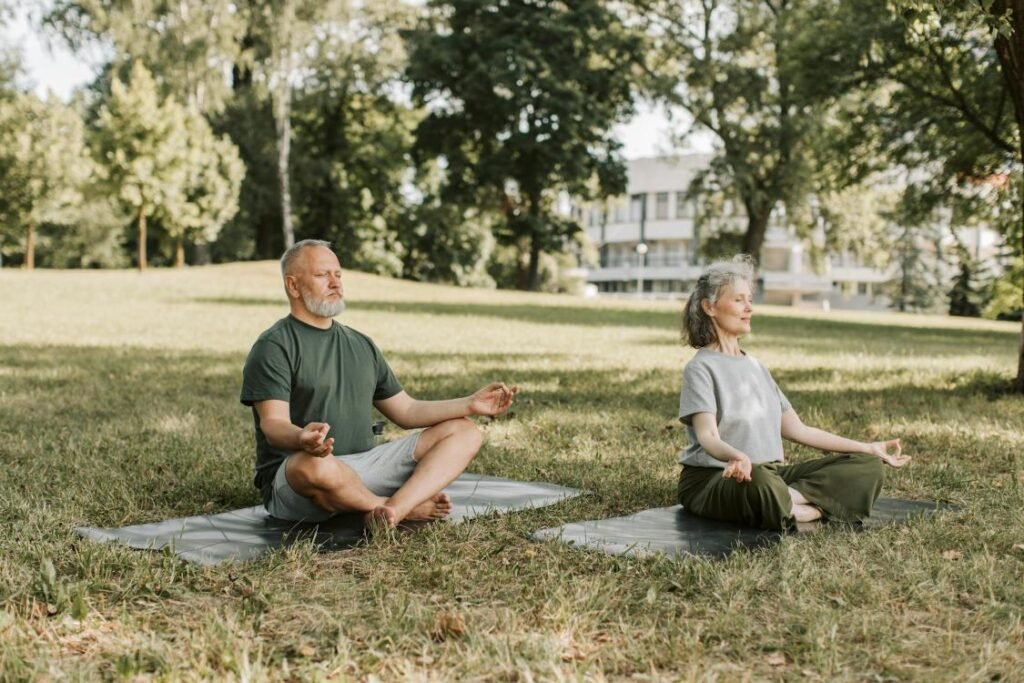How to Increase Energy Levels isn’t just about fighting fatigue—it’s about feeling alive, motivated, and ready to take on your day. If you’ve ever woken up tired, struggled to stay focused at work, or felt your energy crash by mid-afternoon, you’re not alone. Millions of people face this challenge daily, even with enough sleep.
The good news? You can increase your energy levels naturally by making small but powerful lifestyle changes. From nourishing your body with the right foods to practicing mindful habits and managing stress effectively, these proven strategies can help you feel more balanced, focused, and vibrant.
In this guide, you’ll discover 7 proven ways to increase energy levels that actually work—helping you stay productive, motivated, and energized from morning to night.
You’ll learn how to stay energized through smart hydration, sensible caffeine use, and food choices. Movement and stress relief are also key. These methods help stabilize your energy, boost it when needed, and build lasting resilience.
If lifestyle changes don’t lift persistent fatigue, see a healthcare provider. They can check for conditions like sleep apnea, anemia, or thyroid issues that can drain your energy.

Hydration and Smart Beverage Choices to Increase Energy Naturally
Drinking enough water is one of the simplest ways to increase your energy levels naturally. Even mild dehydration can leave you feeling tired, unfocused, and less productive. Replace sugary or caffeinated drinks with water, herbal teas, or low-sugar vegetable juices to keep your body hydrated and your energy stable throughout the day.
Why Hydration Matters for Daily Energy
Water helps your body circulate blood, absorb nutrients, digest food, and think clearly. Without proper hydration, you may feel sluggish and struggle to stay alert. Staying hydrated is one of the most effective lifestyle changes if you’re wondering how to increase energy levels without relying on quick fixes.
How Much Water Do You Really Need?
Most experts recommend drinking around nine cups of water per day for women and 13 for men. A simple guideline is to drink half your body weight in ounces. Increase your intake if you’re exercising, in hot weather, or recovering from illness. Checking your urine color—pale yellow means you’re hydrated—is an easy way to monitor your hydration levels.
Swap Strategies: Reduce Sugary and High-Caffeine Drinks
To boost daily energy and avoid afternoon crashes, cut back on sodas, energy drinks, and heavily sweetened juices. These beverages may give a temporary lift but often lead to sudden energy drops. Instead, choose water, coconut water, or unsweetened herbal teas for sustainable vitality.
When to use electrolytes
Electrolyte drinks are great after hard workouts or on hot days when you sweat a lot. Choose low-sugar options like coconut water or a homemade mix of water, salt, and citrus.
For everyday hydration, stick to plain water and healthy snacks. Save sports drinks for when you need to quickly replace lost salts and potassium.
| Situation | Best Beverage Choice | Why it helps |
|---|---|---|
| Morning pick-me-up | Water + small protein snack | Rehydrates after sleep and steadies blood sugar to increase energy naturally |
| Afternoon slump | Water, green tea, or decaf | Replaces fluids without large caffeine spikes to help how to boost energy fast |
| After intense exercise | Coconut water or homemade electrolyte drink | Replaces sodium and potassium lost in sweat to restore performance |
| Social drinking or late evenings | Limit alcohol; alternate with water | Protects sleep quality and helps increase daily energy the next day |
| When you crave soda or juice | Sparkling water with citrus or low-sugar vegetable juice | Tastes satisfying while you reduce sugary drinks and avoid energy crashes |
How to Increase Energy Levels
How to Increase Energy Levels starts with simple daily habits. Drink more water and avoid caffeine in the evening. Eat balanced meals and limit alcohol. Also, make sure to move your body every day.
These actions improve digestion, mood, and immune function. They help you stay energized during the day and show you practical ways on how to increase energy levels naturally without relying on quick fixes.
Getting enough sleep is key to feeling rested. Aim for 7–8 hours each night and keep a regular bedtime. If you still feel tired, see a doctor to check for sleep apnea, anemia, thyroid issues, or mood disorders. Improving sleep is one of the most effective methods on how to increase energy levels overnight.
Short exercise sessions can give you a boost. Choose activities that leave you feeling refreshed, not tired. If exercise is draining, try reducing intensity or adding rest days. Regular movement is a proven way of how to increase energy levels throughout the day.
Eating the right foods can prevent energy crashes. Choose lean protein, whole grains, and healthy fats to keep your blood sugar stable. This is one of the best nutritional strategies for anyone looking for how to increase energy levels with diet.
For a quick energy boost, try standing, stretching, or taking a short walk. Drinking water or eating a small snack can also help. These actions can quickly improve your focus without using too much caffeine and are simple examples of how to increase energy levels fast.
Supplements and adaptogens can also help. B vitamins and vitamin D support energy production. Ashwagandha, rhodiola, and ginseng may help with stress. But always talk to a doctor before starting any new supplements, especially if you’re on medication. These natural aids can support your journey on how to increase energy levels safely.
If you’re still tired after trying these tips, see a doctor. They can check for underlying medical issues like anemia, thyroid problems, or depression. Treating these conditions along with your daily habits can help you stay energized for good.

Foods, Nutrients, and Meal Strategies for Foods to Increase Energy Levels
Choosing the right foods can change how you feel. Focus on meals that mix complex carbs, lean protein, healthy fats, and fiber. This balance is one of the most effective strategies on how to increase energy levels naturally. Don’t forget to drink enough water to help your body absorb nutrients and keep energy stable.
Best energizing foods to add to your day
Start with oatmeal or whole-grain toast for slow carbs. Add bananas, berries, or apples for quick vitamins and gentle sugar. Eggs, Greek yogurt, or beans provide protein for alertness. These simple choices are everyday examples of how to increase energy levels with food.
Nuts and chia seeds add healthy fats and fiber to prevent crashes. Small snacks like almonds or yogurt with fruit help keep blood sugar steady. These are among the best foods when you’re wondering how to increase energy levels throughout the day.
Vitamins and supplements that support energy
B vitamins are key for energy production. Check foods like fortified cereals, lean meats, and dairy for B vitamins. If levels are low, talk to your doctor about supplements.
Vitamin B12 is especially important for older adults and vegans, as fatigue is a common sign of deficiency. Safe sun exposure boosts vitamin D, while supplements help when levels are low. Green tea and matcha also offer a boost—powerful natural aids in how to increase energy levels safely and effectively.
Problem foods to cut or limit
Limit sugary snacks and sodas that cause energy crashes. Avoid heavy, fried meals and high-saturated-fat foods like fatty meats and full-fat ice cream if you feel sleepy. Highly processed foods can worsen fatigue.
If you think a food sensitivity is causing fatigue, try an elimination diet or see an allergist. This can help you find the right foods to boost energy naturally.
| Category | Examples | Why it helps or harms |
|---|---|---|
| Complex carbs | Oatmeal, brown rice, sweet potato, whole-grain bread | Digest slowly, provide sustained glucose for steady energy |
| Protein sources | Eggs, Greek yogurt, beans, salmon | Support alertness, repair, and long-lasting fullness |
| Healthy fats & seeds | Chia seeds, walnuts, avocado, olive oil | Stabilize blood sugar, support brain health, slow digestion |
| Vitamins linked to energy | Vitamin B complex, B12, vitamin D, iron-rich foods | Support red blood cells and cellular energy pathways |
| Light stimulants | Green tea, matcha, small amounts of coffee | Boost focus with mild caffeine and antioxidants |
| Foods to limit | Sugary drinks, candy, fried foods, high-fat desserts | Cause energy crashes, slow digestion, increase daytime sleepiness |
Exercise, Stress Relief, and Daily Habits to Boost Energy Fast and Sustainably
Boosting your daily energy doesn’t have to be complicated. Small habits like drinking water, taking micro-breaks, eating a light snack, or going for a quick walk can make a big difference. These simple actions are part of proven strategies on how to increase energy levels quickly without overwhelming your schedule.
Exercise is key for sustainable energy. Just 30 minutes of moderate activity a day—like walking, biking, or yoga—can improve oxygen flow, lift your mood, and help you sleep better at night. This is one of the most effective ways to practice how to increase energy levels naturally.
Don’t forget about stress management. Chronic stress can drain your body and leave you feeling exhausted. Relaxation techniques such as breathing exercises, meditation, or even a warm bath with lavender oil are excellent examples of how to increase energy levels while reducing stress.
Natural stimulants also play a role. Herbal teas like peppermint or citrus infusions, along with adaptogens like ashwagandha and ginseng, may improve alertness and resilience. Just be mindful of medications and always consult a professional when needed.
Finally, plan your day around energy peaks. Tackle important tasks when you’re most alert, and use breaks for movement or socializing. This habit reinforces long-term strategies on how to increase energy levels throughout the day.
Combine these tips for a lasting energy plan. Short walks, healthy snacks, stress relief, and regular exercise build strong habits. They help you stay energized now and in the future.
Conclusion
Learning how to increase energy levels doesn’t mean making huge changes overnight. Instead, focus on small, consistent habits—like drinking enough water, eating nutrient-rich foods, and choosing whole grains, lean proteins, and veggies that stabilize your blood sugar.
Regular exercise, mindful stress relief, and natural supplements can also help you stay energized without relying on quick fixes or stimulants. These strategies make a big difference in how you feel every day.
Always pay attention to your body. If you continue to feel tired despite healthy changes, consider checking in with a doctor to rule out underlying issues like sleep problems, thyroid conditions, or anemia. With time and consistency, these small steps can transform your daily life and help you master how to increase energy levels naturally.
FAQ
How quickly can these seven natural strategies increase energy?
Simple actions like drinking water, eating a balanced snack, or taking a short walk can boost energy quickly. For lasting effects, like stable energy and better mood, it takes 2–6 weeks of consistent habits. This includes staying hydrated, exercising regularly, eating well, controlling caffeine and alcohol, and managing stress.
How much water should I drink to reduce daytime fatigue?
Start with about nine cups of water a day for women and 13 cups for men. This is roughly half your body weight in ounces, plus more for exercise or illness. Drinking plain water all day helps avoid energy crashes from sugars and caffeine.
When should I stop drinking caffeine to avoid sleep disruption?
Stop drinking caffeine after 3 p.m. to avoid disrupting sleep. Caffeine’s effects last long and can reduce sleep quality. If you wake up tired, check your caffeine intake and switch to water or herbal tea in the afternoon.
Which foods reliably increase energy without causing crashes?
Eat foods like oatmeal, bananas, eggs, and beans for steady energy. Choose whole grains, lean proteins, and healthy fats. Small snacks like nuts or fruit can keep your energy up between meals.
What foods or drinks should I avoid because they make me more tired?
Avoid simple sugars, heavy fried foods, and too much alcohol. They can cause energy crashes and disturb sleep. If certain foods make you tired, try avoiding them or get tested by a doctor.
Do supplements or herbal remedies actually help increase energy?
Some supplements like B vitamins, vitamin D, and adaptogens can help. Always talk to a doctor before starting supplements. They can improve energy and reduce fatigue.
How much exercise do I need to boost energy without feeling exhausted?
Aim for 30 minutes of moderate activity daily. Short bursts of 10–20 minutes can also help. Adjust the intensity if you feel too tired after working out.
Can dehydration really cause low energy even if I don’t feel thirsty?
Yes. Mild dehydration is common and can make you feel tired. Drinking enough water improves mood and focus. Make hydration a habit, not just when you feel thirsty.
Is alcohol affecting my daytime energy even if I sleep enough hours?
Yes. Alcohol disrupts sleep and can make you tired the next day. Drinking in moderation helps keep your energy levels steady.
What quick strategies can I use when I need to boost energy fast?
Try drinking water, eating a balanced snack, or taking a short walk. Deep breathing or using essential oils can also help. These methods quickly improve alertness and energy.
When should I see a healthcare provider about persistent fatigue?
If lifestyle changes don’t help, see a doctor. They can check for underlying conditions like sleep apnea or anemia. Seek immediate care for severe symptoms like chest pain or confusion.
Are electrolyte drinks better than water after exercise?
Electrolyte drinks are good after intense workouts to replace lost minerals. Choose low-sugar options like coconut water to avoid energy crashes from sugars.
How can I change my workday habits to increase daily energy?
Replace phone scrolling with movement or hydration breaks. Schedule standing or walking breaks and keep healthy snacks nearby. Use short breathing or stretching routines to refresh your mind.
Will cutting carbs help me feel less tired?
Not necessarily. Carbs are key for energy. Focus on complex carbs like whole grains and fruits. Avoid simple carbs that cause energy crashes.
Can improving sleep alone fix daytime fatigue?
Sleep is crucial, but it’s not the only factor. If you still feel tired, consider hydration, diet, caffeine, and stress. A comprehensive approach is best, with medical help if needed.







[…] In today’s fast-paced and high-pressure world, mental health has become as important as physical health, if not more. With increasing awareness about the importance of mental well-being, people are now seeking natural and sustainable ways to enhance their mental health. This article explores some of the best natural methods to boost mental health, providing effective strategies for long-term well-being. […]